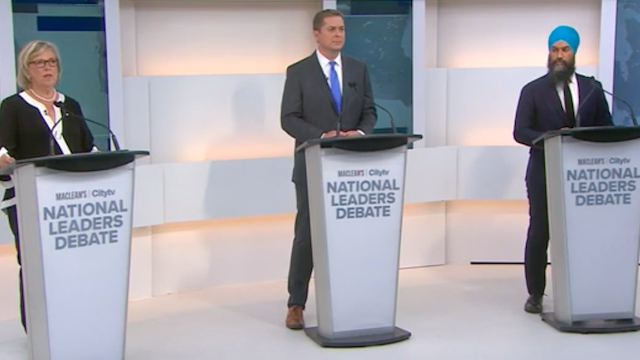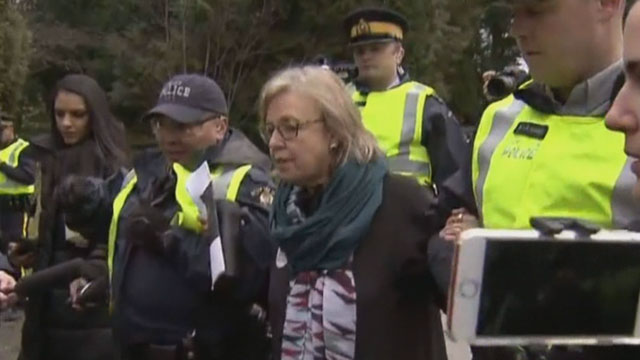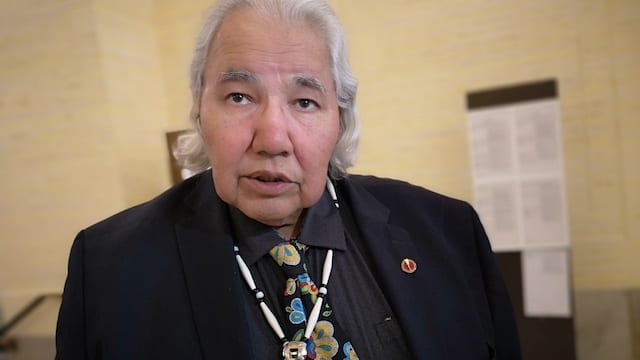
Green Party leader Elizabeth May, Conservative elder Andrew Scheer and NDP leader Jagmeet Singh debated Indigenous rights and related issues for 20 minutes Thursday during Maclean's Magazine's leaders' debate. Photo courtesy Maclean's / YouTube.
Indigenous issues featured prominently in Thursday evening’s leaders’ debate hosted by Maclean’s Magazine.
Three of the four major party leaders discussed child welfare, the United Nations Declaration on the Rights of Indigenous Peoples, the drinking water crisis, the duty to consult and the principle of free, prior and informed consent.
Justin Trudeau, who has maintained throughout his first mandate that there’s no relationship more important to his government than the one with Indigenous peoples, did not attend the debate, which featured a 20-minute question-and-answer period for party leaders.
Thursday’s debate saw a sharp divide between the Green Party and NDP on one side, and the Conservatives on the other, on key issues around Indigenous rights.
Given two opportunities, Conservative leader Andrew Scheer did not answer a question from moderator and Maclean’s writer Paul Wells on whether a Conservative government would accept the recent Canadian Human Rights Tribunal’s ruling that Canada compensate First Nations children who were made wards of the state under the on-reserve child welfare system.
Skirting the question, Scheer said a Conservative government “will be focused on practical things that can alleviate the types of challenges that are facing Indigenous Canadians,” before quickly moving on to long term boil water advisories and then jobs in the natural resources sector.
Green Party leader Elizabeth May called the Tribunal’s Sept. 6 ruling “a huge victory for the work that’s been done to protect Indigenous children, with the government fighting them tooth and nail.”
Asked a second time, Scheer said “it’s essential that the outcome of these type of decisions actually gets the resources to the people that need it the most,” but did not commit to accepting the ruling.
NDP leader Jagmeet Singh said he was “not surprised, but appalled” by Scheer’s response.
Singh said an NDP government “would accept the ruling,” and that “at a minimum we shouldn’t be taking Indigenous kids to court.
“They deserve respect and dignity. That’s what reconciliation’s all about.”
Trudeau has not yet indicated whether his government will appeal the tribunal’s decision.
May said Trudeau “must immediately accept that this is long overdue,” calling the matter a “crisis”.
Wells then asked: “Don’t rulings like this demonstrate how much expectations and frustration have increased even in only the last four years?”
He then turned to the Conservative leader: “Mr. Scheer, doesn’t that make it a much greater governing challenge than it was even the last time a Conservative government was in power four years ago?”
Scheer agreed, saying “if there’s one area where Justin Trudeau raised expectations to levels that he has been a complete disappointment on, it is Indigenous files.” He cited Trudeau’s dismissal of a woman from Grassy Narrows who interrupted a high-end Liberal fundraising event last spring. In response, Trudeau said, “Thank you very much for your donation,” as the woman was escorted out of the room, prompting widespread condemnation and allegations of racism.
The debate then moved to the United Nations Declaration on the Rights of Indigenous Peoples (UNDRIP), which Canada has ratified at an international level but has not codified into law domestically.
Last year the House of Commons passed Romeo Saganash’s private member’s Bill C-262, legislation that would have compelled the federal government to review its laws and attempt to align them with the global minimum human rights standards for Indigenous peoples.
But Conservative Senators stalled and ultimately killed the bill in June before parliament adjourned for the summer.
Scheer was criticized from all corners over his purported support for the bill in the lower chamber, and his silence around the behaviour of his caucus members in the upper chamber.
On Thursday the Conservative leader reiterated the Senators’ primary concern with the bill — that recognizing Indigenous peoples’ right to free, prior and informed consent would hurt the economy, including Indigenous peoples’ access to jobs in the resource sector.
Scheer said C-262 has “many laudable goals” that a Conservative government would support, but that “we cannot create a system in this country where one group of individuals, one Indigenous community, can hold hostage large projects that employ so many Indigenous Canadians.”
Scheer said “there are many Indigenous Canadians who will benefit from [the] Trans Mountain [pipeline],” adding, “yes, there are people who are opposed to it, but we do not live in a country where any one group of people have a veto.”
Singh called Scheer’s language around Indigenous rights and the right to consent “disrespectful,” while May referred to Scheer’s response as “inappropriate.”
“The language you are using is so inappropriate when talking about Indigenous Canadians,” May responded.

Elizabeth May was arrested while protesting the Trans Mountain pipeline in Burnaby, B.C. last year. File photo.
“You are missing the fact that Section 35 of the constitution is already interpreted by the courts, [and] goes almost all the way to what the United Nations Declaration on the Rights of Indigenous Peoples,” she said.
“Consulting is not, ‘I will consult with you until you agree what we’ve already decided.’ That’s not consultation. It’s what Trudeau thinks is consultation, it’s what you think is consultation. But it has to be free, prior and informed consent.”
Singh said Scheer was “talking as if he doesn’t understand the reality” of Indigenous rights.
“You’re going to have to work with communities,” he said. “If you don’t have communities buying in, projects won’t go ahead.”
Singh said the government “should move forward with respect and dignity.”
“It’s better for business if we ensure that we have a process we know is going to work. We’re going to work with communities and make sure that they feel engaged, involved. And yes, that means they can say no. And yes that means they can say yes. These things work together and partnership is the only way forward.”
Scheer then doubled down on his point: “What happens if one Indigenous community says no?”
May reminded Scheer that he’s talking about Indigenous nations, not just communities.
“The language you are using shows no respect,” she said.
The Conservatives’ concern that recognizing Indigenous peoples’ right to give or withhold consent to resource projects on their lands that could adversely impact them was addressed multiple times by Senator Murray Sinclair, a former judge, last spring.
Sinclair pointed out that a First Nation or other Indigenous peoples’ decision to withhold consent around a pipeline did not amount to what Conservatives have repeatedly called a ‘veto’.

Senator Murray Sinclair said earlier this year that recognizing Indigenous peoples’ right to free, prior and informed consent does not amount to having a ‘veto’ on resource development projects. APTN file photo.
The UNDRIP principle of free, prior and informed consent “is a very simple concept,” Sinclair said in May. “And that is, before you affect my land, you need to talk to me, and you need to have my permission.
“That doesn’t mean that we’re vetoing it. It doesn’t mean that First Nations people, or Indigenous people outside of Indian reserves, are vetoing anything,” he continued. “Just because they say you can’t run a pipeline across my land doesn’t mean you can’t run it somewhere else.”
Scheer supported his argument against the right of free, prior and informed consent by saying Indigenous peoples also have a right to say yes to resource development projects.
Instead of pointing out the contradiction in Scheer’s statement that Indigenous peoples’ rights may have to be violated in order to be respected, Wells asked: “Does the Conservative leader not have a point? Is there not division among Native Nations over some of these projects?”
Scheer also wasn’t challenged on his argument that a single Indigenous nation or community was standing in the way of a pipeline or other project.
A number of First Nations are involved in the most recent legal challenge to the now publicly-owned pipeline.
May compared Trudeau’s failure to adequately consult with Indigenous peoples on Trans Mountain to the Harper Conservatives’ failure on Enbridge’s Northern Gateway Pipeline.
“We have governments that think that consultation is to keep talking at Indigenous Nations and groups until they agree,” she said.
“Now in the context of territorial recognition, you can’t treat Indigenous Canadians as though they were an interest group or a lobby. The rights they have in the constitution, and which we as federal leaders have a fiduciary responsibility to protect—even under Section 35, much less under UNDRP—require a rootedness in territory.”
At the Liberals’ press conference in June when they announced the government’s reapproval of Trans Mountain, Trudeau defined free, prior and informed consent as “engaging, looking with [Indigenous communities], listening to the issues they have, and responding meaningfully to the concerns they have wherever possible.”
Days before the 2015 election he told APTN that, “[u]ltimately, even though governments grant permits, only communities grant permission.”
Implementing UNDRIP was a key promise of Trudeau’s first election campaign as Liberal leader.
Asked why the Liberals’ didn’t adopt Saganash’s legislation as a government bill to ensure its passage into law, Crown-Indigenous Relations Minister Carolyn Bennett told APTN in June the party would introduce similar legislation if re-elected.
The NDP and Greens have both promised to fully implement UNDRIP.

Jagmeet Singh and the NDP have also promised to develop a ‘National Action Plan for Reconciliation’ that would, among other things, include a plan to implement UNDRIP. APTN file photo.
In Thursday’s debate Singh referred to Bill C-262 as a “transformative piece of legislation.” He has signalled that the NDP would introduce a similar bill if elected.
“What it essentially says is that we should treat Indigenous peoples with respect, as equal partners,” he said of UNDRIP.
May said Thursday a Green government would implement the Truth and Reconciliation Commission’s calls to action and the National Inquiry into Missing and Murdered Indigenous Women and Girls’ calls for justice.
“And that’s just the beginning of working for real justice, which means allowing First Nations, Indigenous, Metis and Inuit societies that self-identify — they decide who’s a member of their community,” she said, adding the Greens would do away with the Indian Act, which she said serves to enforce “structural violence.”
The Conservatives have not released a platform. Last December Scheer was booed while addressing leaders at an Assembly of First Nations event in Ottawa. He told the chiefs and delegates that a platform on Indigenous issues would be forthcoming.
In addition to skipping the first leaders’ debate with substantial questions around Indigenous rights and issues, Trudeau also neglected to mention Indigenous peoples in his opening campaign speech when he called the election on Wednesday.
He appealed to middle class Canadians, single parents and families, workers, recent graduates, seniors and pensioners and new Canadians in his speech, but did not mention Indigenous peoples.
“I’m for moving forward for everyone,” the prime minister said, concluding his speech.
Trudeau has agreed to participate in three of six leaders’ debates. He will join in two French language debates Oct. 2 and 10, and one English language debate on Oct. 7.









